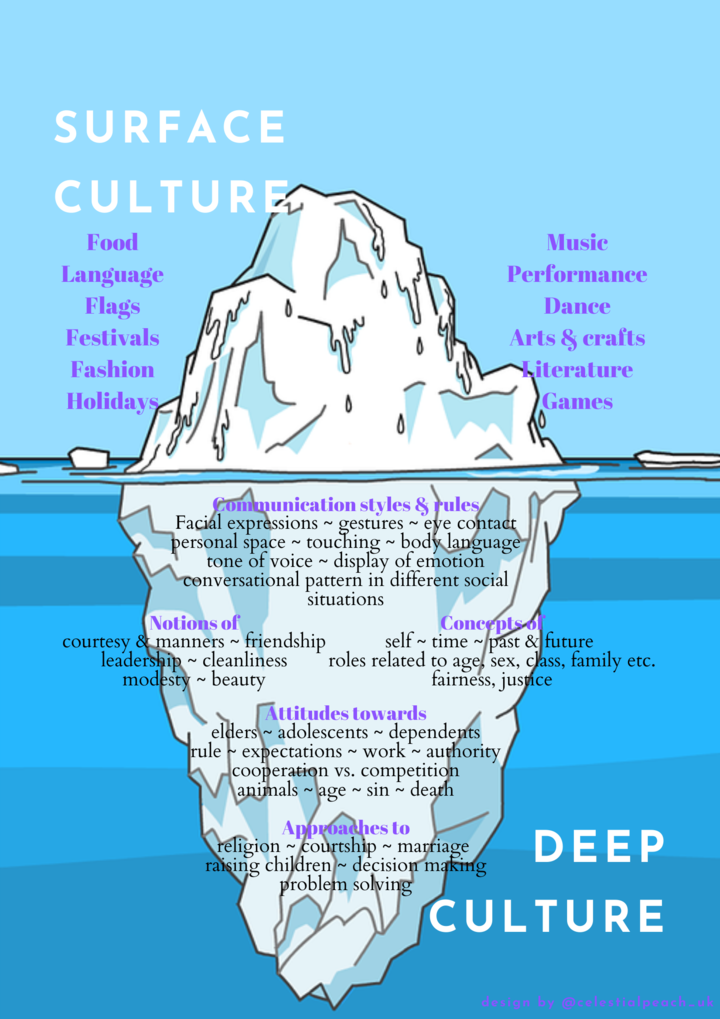Traveling and living in an unfamiliar culture can be incredibly exciting, but it can also present significant challenges. While on your program, you may experience an increased awareness of your specific identities and how they may impact your experience and/or the experiences of your peers. Some of the differences you identify in the host culture will be obvious: language, climate, clothing, food, daily routine, local transportation, etc. Other differences, however, will not be as obvious and will take time to notice similarities and differences in cultural values, perceptions, attitudes and beliefs. Think about learning about a cultural like an iceberg; your goal is to participate in the "surface culture" and to observe and understand the "deep culture" during your time in country.
Surface Culture
Food, language, flags, festivals, fashion, holidays, music, performance, dance, arts & crafts, literature, and games
Deep Culture
Communication Styles & Rules
Facial expressions, gestures, eye contact, personal space, touching, body language, tone of voice, display of emotion, and conversational pattern in different social situations
Notions of
Courtesy & manners, friendship, leadership, cleanliness, modesty, and beauty
Concepts of
Self, time, past & future, roles related to age, sex, class, family etc., fairness, and justice
Attitudes towards
Elders, adolescents, and dependents, rules, expectations, work, authority, cooperation vs. competition, animals, age, sin, and death
Approaches to
Religion, courtship, marriage, raising children, decision making, and problem solving

We all identify on campus as Huskers. Will the host country and culture abroad equally recognize this significant aspect of your campus identity? Most likely, no. In addition, how will the other aspects of your identity be perceived while abroad? How will your identity be supported in the host culture? Students who are members of visible and non-visible minority groups may face particular challenges while studying abroad. Students who may be living as a member of the majority group here in the United States may become a member of the minority group for the first time while living in their host culture. Cultural differences can also cause feelings of uncertainty, anxiety, and frustration, as you feel cut off from the cultural cues and patterns with which you are familiar.
Please note that not every social identity is listed throughout these webpages. As you prepare for your experience abroad, please review the resources on these pages and reach out to the Education Abroad Office should you have any questions.
Resources
If you really want to dive in to this subject, check out the following resources:
- Stories, Skills, and Resources: University of Michigan Resilient Traveling - Managing Stress & Enhancing Your Experience Abroad
- Book: Preparing to Study Abroad: Learning to Cross Cultures by S. Duke (2014)
- Book: Published by Institute of International Education: A Student Guide to Study Abroad by S. Nevadomski, A. Goodman & C. Taylor (2013)
- DA Global Culture & Diversity Destination Guides
- DA Global Articles & Resources
- Counseling and Psychological Services (CAPS)
- Gender and Sexuality Center
- Services for Students with Disabilities Office
- Mobility International
- Glimpse Abroad: Culture Shock
- Glimpse Abroad: American Identity Abroad
- U.S. Department of State - International Travel
- Gilman International Scholarship: Pre-Departure Toolkit
(Image https://www.celestialpeach.com/blog/cultural-iceberg-cultural-appreciation)